Depression Treatment
What is Depression?
Depression is more than just experiencing temporary feelings of unhappiness or being fed up for a brief period. While it’s common for individuals to go through phases of feeling down, depression manifests as persistent sadness that lasts for weeks or even months, rather than fleeting moments of melancholy. Despite some misconceptions that dismiss depression as trivial and not a legitimate health issue, it is indeed a genuine illness with tangible symptoms. Contrary to the belief that depression signifies weakness or can be overcome by simply “pulling oneself together,” it is a serious condition that requires proper attention and treatment.
Depression is a prevalent mental health disorder, affecting approximately one in ten individuals at some stage in their lives. It does not discriminate based on gender or age, impacting both men and women across various age groups.

Causes of Depression
Sometimes there’s a trigger for depression. Life-changing events, such as bereavement, losing your job or even having a baby, can bring it on. People with a family history of depression are more likely to experience it themselves. But you can also become depressed for no obvious reason.
Some common causes include:
- – Stressful events
- – Giving birth – women are particularly vulnerable to depression after pregnancy
- – Loneliness – being detached from family and friends can increase your chance of being depresse
- – Alcohol and drug abuse
- – Having a long-term chronic condition can make you more anxious and more prone to depression
Symptoms of Depression
The symptoms of depression can be complex and vary widely between people. But as a general rule, if you’re depressed, you feel sad, hopeless and lose interest in things you used to enjoy.
Other psychological symptoms of depression include:
- – Feeling irritable and intolerant of others
- – No motivation or interest in things
- – Finding it difficult to make decisions
- – Not getting any enjoyment out of life
- – Suicidal thoughts or thoughts of harming yourself
- – Speaking more slowly than usual
- – Changes in appetite or weight, constipation
- – Lack of energy
- – Low sex drive (loss of libido) or changes to your menstrual cycle
- – Disturbed sleep
Treatment for Depression
Treatment for depression will depend on whether you have mild, moderate or severe depression.
If you have mild depression, your doctor may suggest waiting to see whether it improves on its own, while monitoring your progress. They may also suggest lifestyle measures such as exercise and self-help groups. Cognitive behavioural therapy (CBT) is often used for mild depression that isn’t improving or moderate depression. Antidepressants are also sometimes prescribed.
Furthermore, for moderate to severe depression, a combination of talking therapy and antidepressants is often recommended in order to improve your mental health.
